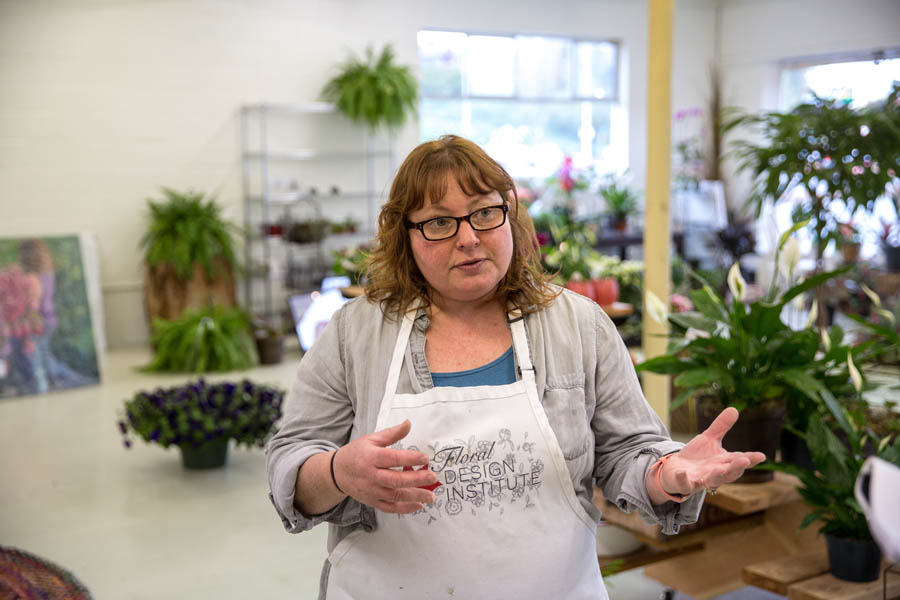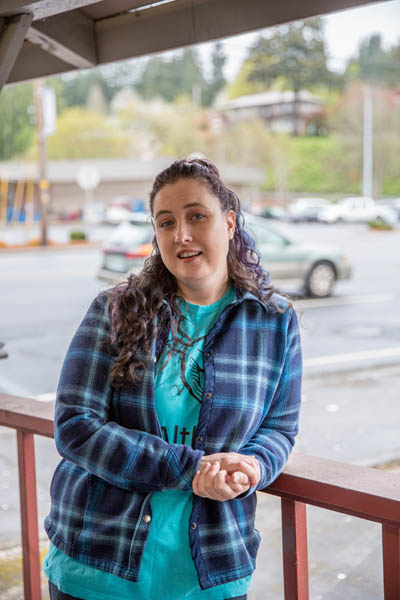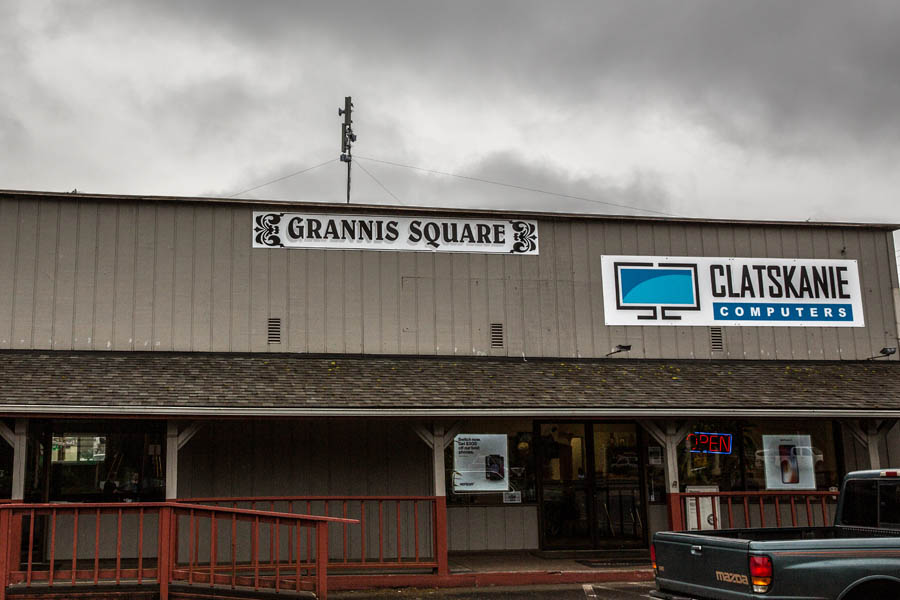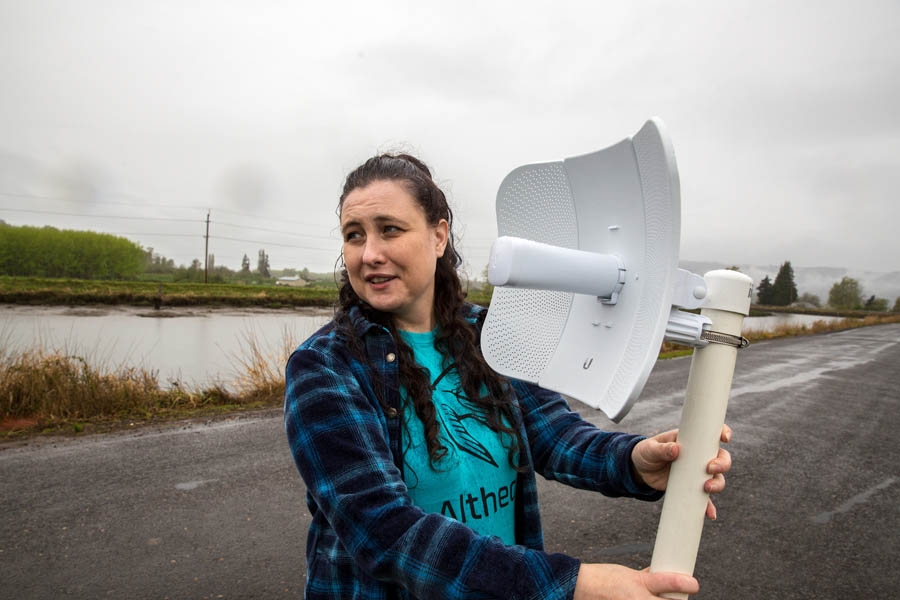A net-neutrality activist is pioneering cheap, fast internet in a rural Oregon town. Could this be a solution to bridging the digital divide?
One rainy spring day in the small logging town of Clatskanie (pop. 1,800), near the Columbia River, Linda Depersis expertly finished assembling a bouquet of flowers inside her store on the town’s main street. Selling flower arrangements is the mainstay of her business, and like many small retailers, she relies on the payment platform Square to process credit- and debit-card payments.
While payment-processing software has progressed by leaps and bounds, for a long time her internet connectivity had not. Depersis needs a reliable connection to process payments through the Square software, as well as at her home, where she uploads pictures of flowers to sell online. Living in a rural area, where internet service providers often lack financial incentives to upgrade infrastructure, she has often had to put up with a slow and expensive connection.
As luck would have it, Depersis’s shop is located just a few hundred feet from a computer repair store that is the hub of a pioneering project to offer cheap and fast broadband through a decentralized internet service. The purveyor of the technology is Deborah Simpier, co-founder and chief operating officer of Althea, a startup that has chosen Clatskanie to launch its first U.S. autonomous-bandwidth market.
 Linda Depersis, owner of a flower shop in Clatskanie. Depersis is a subscriber to the Althea network.
Linda Depersis, owner of a flower shop in Clatskanie. Depersis is a subscriber to the Althea network.
At the heart of Althea’s business is special software the founders created, which runs on routers. This software allows routers inside a network to pay each other for bandwidth. The routers send internet traffic along the cheapest and most efficient route available, helping to keep down costs for internet.
Users own the routers instead of renting the equipment from an internet service provider. The payment model is also unique: Subscribers load up their routers to pay for the service as they use it. This does away with fixed contracts that many of the larger providers require customers to enter into.
The overall result is a decentralized internet service in which anyone in a community can set up a router to receive internet. Crucially, users can also earn money by selling bandwidth to other users. Each router has the ability to forward on traffic to other routers. Subscribers earn a portion of the transaction fees for selling the bandwidth. Similar to a franchise model, Althea makes around 5% on the revenue generated from the local network’s transaction fees.
Improving access to broadband in rural areas is a game changer for increasing these communities’ economic prospects. A lack of bandwidth limits educational opportunities and information exchange. It also discourages businesses from relocating to rural areas and creating jobs.
Yet a high portion of Americans living in rural areas still lack broadband. Nearly one-fourth of the rural population — 14.5 million people — lacks this service, according to the Federal Communications Commission. In some Oregon counties, the percentage of households that have broadband access, defined as 25 megabytes per second by the federal agency, is less than 7%. These include Baker (6.5%) and Sherman (1%) counties. Harney and Wheeler counties have no broadband access.
Could decentralized internet services of the type that Althea provides be the key to unlocking economic development in rural towns? All eyes are on the Clatskanie experiment.
Simpier, 38, is passionate about breaking the monopolies that large internet service providers have on the market. Her brand of decentralized, community-run internet is a way to “exert a more democratic role,” she says.
A native of Washington, Simpier moved to Clatskanie several years ago from Hillsboro, where her husband worked for Intel. The couple tried to make a living raising alpacas, but when the business didn’t work out, they turned their hand at running a computer repair store on Clatskanie’s main thoroughfare.
A self-proclaimed net-neutrality activist, Simpier researched the concept of mesh networks as an alternative to providing cheap and fast internet to local communities. Mesh networks are systems in which internet devices connect directly and non-hierarchically to route data to users in the network. Several volunteer-run mesh networks exist in the U.S., including NYC Mesh in New York and People’s Open, a community-owned wireless network in Oakland, California.

While researching mesh networks, Simpier came across a video talk by Jehan Tremback, a San Francisco-based tech entrepreneur, who also had an interest in the mesh-network concept. He had volunteered at the People’s Open mesh network in Oakland but wanted to branch out and create an organization that could monetize the service, thereby creating accountability for the smooth running of the operation — something that volunteer-run mesh networks lack. “If something goes wrong, nobody is on the hook for fixing it. I thought there must be some way of combining the structure with monetary compensation,” says Tremback.
The tech entrepreneur and Simpier met in 2017 and co-founded Althea, along with Justin Kilpatrick, an engineer and the company’s chief technology officer.
In Clatskanie, Simpier’s own router resides in the back room of her computer repair store. From there she relays bandwidth through an antenna on her store’s roof to residents who have signed up for the service. Users belong to a cooperative, which Simpier organizes. She is responsible for growing the user base, helping with installation and fixing problems.
Another unique part of the Althea service is the use of cryptocurrency for payment. Subscribers load up their routers with the cryptocurrency Ethereum, which they pay for through a Coinbase app. The money they earn from forwarding on internet is added to their account. The more money they earn, the cheaper their own internet becomes.
Tremback says the founders chose cryptocurrency because of the ease with which the payment can be set up on routers. The payment model is also in keeping with the decentralized nature of the service. It is no coincidence that Althea’s investor is KR1, a European blockchain investment company, which funds early-stage decentralized and open-source blockchain projects.
Flower shop owner Depersis signed up for the service to see if it would be a good alternative to traditional internet service providers. The town’s local carrier, Frontier Communications, offered good but expensive internet, she says. Her previous provider, Cascade Networks, which was bought by Wave Broadband, had a reputation for poor customer service. When she complained about her slow connection, the company didn’t bother to send anyone out to fix it.
So far, she is pleased with the Althea service. “It is super quick and fast. I had a few glitches, but Deborah got those fixed straight away,” she says.
Althea provides between 50 and 60 megabytes per second of bandwidth for less than $40 a month, compared with $150 a month typically charged by local internet service providers, sometimes for speeds as low as 1 megabyte per second. Because the median income of rural residents is lower than urban residents, broadband offered by traditional internet service providers is often out of reach for many.
Depersis relays traffic to four other users, including a laundromat next door. She also has a broadcast tower installed next to her home. All around Clatskanie, subscribers to the network have antennas on their roofs, which can broadcast bandwidth up to 5 miles.
 Flower shop owner Linda Depersis relays internet from a broadcast tower installed at her home in Clatskanie
Flower shop owner Linda Depersis relays internet from a broadcast tower installed at her home in Clatskanie
Another user in the town is Clark Folsom, an Intel retiree, who recently moved to Clatskanie from the Portland suburb of Forest Grove. Folsom, who helps out in Simpier’s computer repair store, says he “had no idea” there would be no broadband when he moved there.
“I called Frontier and they could only put in 1.5 megabytes,” says Folsom. Eventually the provider bumped him up to 9 megabytes of download. But the slow connection meant it was difficult to stream movies and music at home. Twenty-five megabytes per second is considered adequate for light use. After signing up to Althea, he now receives 40 megabytes per second of upload. The quality of the movies he can now stream is “fantastic,” he says.
So far, 33 residents have signed up to the Althea service since the company launched at the beginning of the year. Simpier says the company will break even when it has between 40 and 50 customers. It will need at least 100 users before turning a profit.
Althea’s largest overhead cost comes from paying for fiber-optic infrastructure. It pays $1,400 a month for access to fiber-optic lines provided by NoaNet, a nonprofit that operates a fiber network, primarily in Washington. NoaNet was formed in 2000 by several Washington public utility districts to bring high-speed telecommunication services to underserved communities.
Simpier says she sees opportunities for municipalities to enter partnerships with Althea to install fiber cable in rural communities that lack infrastructure. “It is definitely very challenging where there is no fiber,” she says.
 An antenna on top of Simpier’s computer repair store relays internet to the town’s residents
An antenna on top of Simpier’s computer repair store relays internet to the town’s residents
Clatskanie is the test bed for Althea. If it works out, the company’s founders want to expand further. Another experimental Althea network is set up in a hillside community in the province of Medellín, Colombia. Closer to home, the startup plans to launch a service in Newberg in the Willamette Valley. Its approach there will be a little different; it plans to pre-register users before investing in network infrastructure.
Tremback says communities all over the U.S. and abroad have reached out to the company with interest in setting up decentralized internet service, including communities in Tucson, Arizona; Costa Rica; Saskatoon in Canada; Tacoma, Washington; and New York City.
Even in highly urbanized areas such as New York, traditional internet service providers often have a monopoly in which they are “not motivated to improve service,” says Simpier. She adds that, closer to home, internet service “is barely adequate just outside Portland.”
Some rural towns have already taken broadband access into their own hands, investing large amounts of money into municipally run networks. The town of Independence, near Salem, is one such jurisdiction that invested heavily into its own municipal broadband to lift its economic prospects. The remote town of Maupin in Central Oregon also entered into a public-private partnership to provide fast and reliable internet to its residents.
RELATED STORY: Fertile Future
But these jurisdictions are more the exception than the rule. Many rural communities still lack access. With broadband still an out-of-reach dream for many rural-ites, Althea’s model of a community-run internet may just be the solution they are looking for.
Back in Clatskanie, more residents are showing interest in joining the Althea network. Five customers have signed up since I visited in mid-April. Other municipalities will no doubt take notice if the project expands.
Oregon is an ideal place to test and grow the technology, Simpier says. “There is a wonderful spirit of rugged innovation. It shows through in people’s willingness to try new things.”
Photos by Jason E. Kaplan
To subscribe to Oregon Business, click here.









